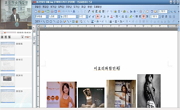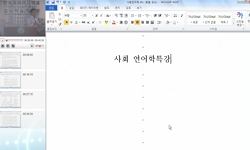This study seeks for an interpretation process of the implicative mechanism in advertising language from a cognitive linguistic perspective. Advertising is an indirect act of conversation in which advertisement producers realize special objects on the...
http://chineseinput.net/에서 pinyin(병음)방식으로 중국어를 변환할 수 있습니다.
변환된 중국어를 복사하여 사용하시면 됩니다.
- 中文 을 입력하시려면 zhongwen을 입력하시고 space를누르시면됩니다.
- 北京 을 입력하시려면 beijing을 입력하시고 space를 누르시면 됩니다.
부가정보
다국어 초록 (Multilingual Abstract)
This study seeks for an interpretation process of the implicative mechanism in advertising language from a cognitive linguistic perspective. Advertising is an indirect act of conversation in which advertisement producers realize special objects on the consumer. If one hopes this unilateral and indirect discourse activity to be successful, she needs to search for a systematic and unified theory existing within advertising language and to derive the closest interpretation to the theory. In order to draw an interpretation process of successful advertising language, the language is classified in terms of several characteristics depending on the degree of implication: non―implicative, low―implicative and high―implicative advertising languages. Advertising language using the non―implicative mechanism is interpreted through deductive reasoning on the basis of indicative meaning and background information. Due to the lack of implication, there is no need to contemplate the implicative meaning. In case of advertising language using the high―implicative mechanism, however, an interpretation of an implicative meaning starts from questioning the indicative meaning of metaphors, which are interpreted context―deductively according to the cognitive principles of the customer to correspond with the theme.
The actual process of cognitive interpretation differs according to the structure of the context, and the context structure in advertising depends heavily on advertising techniques. This interpretation process differs according to the structure of the context, and the context structure in advertising significantly affects advertising techniques. With this in mind, advertising languages categorized by the implicative mechanisms are analyzed. The results confirm that the meaning, which advertisement producers imply in advertising language to persuade the consumer, can generally be provided through various information and an analytical tool based on cognitive effects.
A consumer does not interpret the meaning implicated in advertising language literally but exhibits cognitive ability by applying language data and her own background information. In the end, she can communicate fully using this ability. The actual process of an analysis on advertising language will differ depending on the degree of implication, but, in any case, the fact that a context―deductive interpretation is made in accordance with cognitive principles is fundamentally the same. The process is completed by confirmation (discovering whether there are conflicts or no conflicts related to cognitive principles), search (seeking an appropriate interpretation), comprehension (discovering the possibility of interpretation) and the derivation of meaning (deriving a finalized meaning by substituting what the consumer comprehends to the context).
참고문헌 (Reference)
1 이수련, "한국어와 인지" 박이정 13-20, 2001
2 "한국방송광고공사"
3 "한국광고 TVCF"
4 이성범, "추론의 화용론" 한신문화사 2001
5 임지룡, "인지의미론" 탑출판사 1997
6 임지룡, "인지언어학적 관점에서 본 의미의 본질" 한국어의미학회 21 : 1-29, 2006
7 김동환, "인지언어학과 의미" 태학사 2005
8 이정모, "인지심리학과 뇌" 인지과학회 (여름) : 1999
9 임지원, "유머 담화의 의미 해석 -텔레비전 광고텍스트를 자료로 하여-" 한국현대언어학회 25 (25): 777-796, 2010
10 임지원, "유머 담화의 생성 기제와 조건" 우리어문학회 (28) : 129-157, 2007
1 이수련, "한국어와 인지" 박이정 13-20, 2001
2 "한국방송광고공사"
3 "한국광고 TVCF"
4 이성범, "추론의 화용론" 한신문화사 2001
5 임지룡, "인지의미론" 탑출판사 1997
6 임지룡, "인지언어학적 관점에서 본 의미의 본질" 한국어의미학회 21 : 1-29, 2006
7 김동환, "인지언어학과 의미" 태학사 2005
8 이정모, "인지심리학과 뇌" 인지과학회 (여름) : 1999
9 임지원, "유머 담화의 의미 해석 -텔레비전 광고텍스트를 자료로 하여-" 한국현대언어학회 25 (25): 777-796, 2010
10 임지원, "유머 담화의 생성 기제와 조건" 우리어문학회 (28) : 129-157, 2007
11 이정모, "연결주의: 이론적 특성과 문제점. in: 인지언어학의 제 문제Ⅰ" 성원사 1996
12 김진우, "언어와 심리" 한신문화사 89-95, 1988
13 임지원, "메타텍스트의 인지적 의미 해석 과정 ―패러디 광고텍스트에 대한 수용자의 인지책략과 관련하여" 인문과학연구소 36 (36): 53-76, 2009
14 이민행, "광고카피와 대화함축" 독일언어문학회 (13) : 53-68, 2000
15 "광고정보센터"
16 임지원, "광고언어의 인지적 의미 해석 과정 연구" 충남대학교 2008
17 박영준, "광고언어론" 커뮤니케이션북스 2006
18 임지원, "광고어의 함축과 그 추론과정" 어문연구학회 49 : 177-209, 2005
19 김완석, "광고 언어의 심리학 -광고의 언어적 주장을 통한 소비자 오도 효과에 관하여-" 국립국어연구원 2 (2): 35-49, 1992
20 박원정, "광고 속에 나타난 비유법과 적합성원리" 47-55, 1995
21 Sperber, D., "Relevance: Communication and Cognition" Blackwell 1986
22 Mey, J.L, "Pragmatics: An Introduction" Blackwell 1993
23 Grice, Herbert P., "Logic and conversation. in: syntax and semantics 3: speech acts" New York Academic Press 41-58, 1975
24 Taylor, John R., "Linguistic Categorization : Prototypes in linguistic theory" Oxford University press 1989
25 Taylor, John R., "Introduction : On construing the world. in: language and the cognitive construal of the world" Mouton de Gruyer 1-21, 1995
26 "CM전략연구소"
동일학술지(권/호) 다른 논문
-
- 충남대학교 인문과학연구소
- 이경숙
- 2010
- KCI등재
-
- 충남대학교 인문과학연구소
- 정일
- 2010
- KCI등재
-
- 충남대학교 인문과학연구소
- 이화영
- 2010
- KCI등재
-
- 충남대학교 인문과학연구소
- 이종성
- 2010
- KCI등재
분석정보
인용정보 인용지수 설명보기
학술지 이력
| 연월일 | 이력구분 | 이력상세 | 등재구분 |
|---|---|---|---|
| 2026 | 평가예정 | 재인증평가 신청대상 (재인증) | |
| 2020-01-01 | 평가 | 등재학술지 유지 (재인증) |  |
| 2017-01-01 | 평가 | 등재학술지 유지 (계속평가) |  |
| 2014-01-03 | 학술지명변경 | 외국어명 : 미등록 -> THE JOURNAL OF HUMANITIES STUDIES |  |
| 2013-01-01 | 평가 | 등재학술지 유지 (등재유지) |  |
| 2010-01-01 | 평가 | 등재학술지 선정 (등재후보2차) |  |
| 2009-01-01 | 평가 | 등재후보 1차 PASS (등재후보1차) |  |
| 2008-01-01 | 평가 | 등재후보학술지 유지 (등재후보1차) |  |
| 2007-01-01 | 평가 | 등재후보학술지 유지 (등재후보1차) |  |
| 2005-01-01 | 평가 | 등재후보학술지 선정 (신규평가) |  |
학술지 인용정보
| 기준연도 | WOS-KCI 통합IF(2년) | KCIF(2년) | KCIF(3년) |
|---|---|---|---|
| 2016 | 0.44 | 0.44 | 0.4 |
| KCIF(4년) | KCIF(5년) | 중심성지수(3년) | 즉시성지수 |
| 0.38 | 0.36 | 0.658 | 0.14 |




 KCI
KCI





